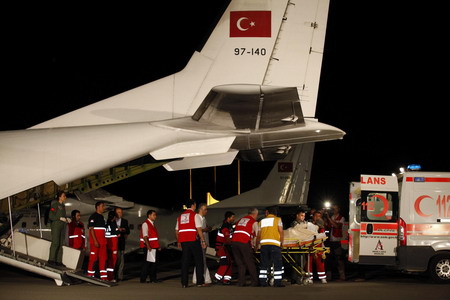Global General
Turkish activist planes land Istanbul
(Agencies)
Updated: 2010-06-03 09:53
 |
Large Medium Small |
|
|
The AP could not independently authenticate the video.
Israel says its commandos fired in self-defense.
Irish Prime Minister Brian Cowen has appealed to Israel to let a private Irish ship deliver its aid cargo to Gaza, but he admitted that Israel would probably block the ship because part of the cargo was concrete, which Israel bans from Gaza because it might be used by Hamas.
The 1,200-ton ship Rachel Corrie is also carrying wheelchairs and other medical supplies, organizers said. It was named after a US college student crushed to death by an Israeli army bulldozer while protesting house demolitions in Gaza. The ship was supposed to join the aid flotilla but was delayed by mechanical problems and is waiting off the Libyan coast.
Those aboard include Mairead Corrigan, a 1976 Nobel Peace Prize winner from Northern Ireland, and Denis Halliday, who previously ran U.N. humanitarian aid programs in Iraq.
Israel dropped plans to prosecute dozens of pro-Palestinian activists detained in the raid, opting instead to deport them all immediately in an apparent effort to limit the diplomatic damage from the raid.
"Keeping them here would do more damage to the country's vital interests than good," Attorney General Yehuda Weinstein wrote in the order.
In Turkey, Yavuz Dede, the vice president of the Foundation for Human Rights and Freedoms and Humanitarian Relief, alleged Israel had failed to account for all the passengers and crew on the six ships and was deliberately delaying the activists' departure to cover up the missing persons.
"We see this delay in the planes' (taking off) as an attempt to disguise the loss of people," Dede told a press conference at the foundation's Istanbul headquarters.
The Israeli Interior Ministry, however, said all those aboard the aid convoy had been accounted for. Haddad listed 702 activists being deported and seven still in Israeli hospitals. She said five were taken to the Lebanese border and repatriated there.
Turkish and Greek protesters flying home on special planes sent by their respective governments, while others from the nearly 20 nationalities on the ships were on commercial flights. More than 120 activists from a dozen Muslim nations without diplomatic relations with Israel were deported to Jordan before sunrise.
Turkish Health Minister Recep Akdag told reporters the first plane to land carried one wounded Turkish activist, whom he identified as Imdat Avli, and one Irish activist, identified by the Irish Embassy as Almahti Alharati.
Akdag said two other air ambulance planes were on their way -- one carrying nine wounded activists and the other eight. Three other planes left for Turkey early Thursday, and another took off for Greece.
The commando raid has seriously strained ties between Israel and Turkey. Turkey withdrew its ambassador, scrapped war games with Israel and demanded a U.N. Security Council session on the clash. Hundreds of Turks protested Israel's commando raid for a third day, and Israeli diplomats' families in Ankara began packing to leave following orders from their government.
The Turkish parliament held a heated debate on whether to impose military and economic sanctions on Israel. Lawmakers of Prime Minister Recep Tayyip Erdogan's ruling Justice and Development Party objected to the measures, apparently wanting to avoid aggravating the situation, but eventually agreed on a declaration approved by a show of hands.
The lawmakers said Israel must formally apologize for the raid, pay compensation to the victims and bring those responsible to justice.
Egypt on Tuesday temporarily opened the Rafah border crossing, Gaza's main gateway to the outside world. About 300 Palestinians crossed Wednesday into Egypt, while a smaller number returned to Gaza along with limited humanitarian aid, including blankets, tents and 13 power generators donated by Russia and Oman.
Nicaraguan President Daniel Ortega said his country was breaking diplomatic relations with Israel. British Prime Minister David Cameron urged Israel to lift the Gaza blockade, calling the raid "completely unacceptable."
Pope Benedict XVI urged both sides to resolve the problem with dialogue, telling pilgrims in St. Peter's Square that he was worried the raid would have "dramatic consequences and generate more violence."
